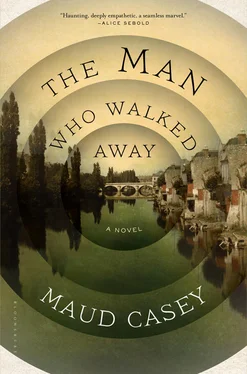“There have been too many substitutions,” she says. “I am exhausted.”
“Yes.” He isn’t sure what she’s talking about, but it doesn’t matter; he knows what it is to be exhausted.
When he sits, the woman nods, and the tightness of her older face relaxes; there again is the face inside her face. Its dimple returns.
Ring ( shadow ring ).
“Those bells will ring you into next year if you let them,” the woman says. “I’m not going anywhere. Sit with me a while longer.”
“I’d like that.” A drop of rain falls on Albert’s cheek; so clear and bright on his skin it hurts. “I don’t mind the rain.”
A man as old as the lamplighter but not so grizzled appears in the doorway and walks toward them cautiously, as if they were on fire. “There you are, Marian, my dearest one,” he says to the woman. He puts a tentative hand that smells like pudding on Albert’s shoulder. “I wanted to see for myself. It’s hard to tell. The concocted ones are very lifelike.”
“We’re enjoying the weather, Walter,” the woman says.
“It’s starting to rain,” Walter says.
“We were sitting peacefully.” She sighs, her eyes gray as the sky.
Those eyes are strangely familiar to Albert, like the clean, bright rain on his tongue — but then everything is strangely familiar. Once, when he stopped, he curled up in a hollow log rotting from the inside out. He had hoped to rot away too, but instead he woke to lightning splitting a tree nearby. Why had he not chosen to sleep near that tree? He huddled with sheep and a lone cow in a pasture, hoping to wake up transformed into a sheep or a cow, as dumb as that. When he heard laughter he thought, Maybe they are not so dumb, these sheep and this cow, maybe they’re laughing at me , but it was a group of men and women huddled together farther down the field, whispering and laughing around a fire. His heart beat faster, hoping these were his people.
“Join us,” one of them said.
“We’ll teach you all the tricks,” another said.
“No one needs to learn your dirty tricks,” said a third.
These whispering, laughing men and women moved only when they had to, they told him, only to avoid arrest. They spoke to one another the same way this woman and Walter did, confident the other wouldn’t disappear; it wasn’t even a question, and Albert thought for a moment he could join their group. Then one of the men huddled around the fire touched Albert’s shoulder with a hand as cold as glass and Albert felt himself on the verge of shattering so he walked away into the night.
Though Walter’s hand is warm, his touch is like the rain, painful in its clarity. Still, Albert lets Walter squeeze his shoulder as he looks up at the dark sky, considering. “Masterful,” he says. “Masterful.”
“At what?” Albert asks. Though the man’s touch on his shoulder hurts, he doesn’t feel afraid. This seems less like a trick than like a secret language.
Walter squeezes Albert’s other arm—“Quite real, I believe”—then one leg. He is about to squeeze the other leg when an enormous potato-faced man appears and takes him gently by the arm.
“Walter,” the large man says.
“Yes, Claude?” Walter says to the man. “Not one of the real,” he whispers to Albert.
“It is nearly time to come to the table,” Claude says, giving Walter a stern look.
“May I squeeze you, darling Marian?” Walter asks when Claude and his stern look leave.
Marian laughs.
Ring ( shadow ring ). “It is time for breakfast,” she says, pulling her shawl around her as she stands. It has started to rain in earnest.
Ring ( shadow ring ). Is it time for breakfast? Is it time for lunch? Is it time for dinner? Entering into time is like squeezing through a too-small door. Still, Albert wants these to be his questions now.
“Just one arm?” Walter asks. “I’ll squeeze it quickly so you won’t even notice.”
“What is wrong with you?” Marian says.
“You are crueler than you know,” Walter says.
“I know precisely how cruel I am,” Marian says.
It is a murmur with no words at first, and then a windy whisper. Il revient, il revient . It calls Albert back — he returns, he returns — but he doesn’t want to return. He wants to follow Marian and Walter inside as they argue their way toward breakfast.
But the whisper insists. This is not what Albert has been listening for. This is the same old life calling him back. He was a fool to think it had gone away. Perhaps if he goes to his room— Here is your room, here you are, yes, right here— and lies down he can make it go away. “Please excuse me,” he says to Marian and Walter as they walk back inside and begin down the hallway. He will take care of this in private and then he will return to become a normal man tick-tocking his way through the day. Why can’t he be? “Please excuse me,” he says again, and Walter and Marian turn. “I will be there soon.”
“You are excused,” Marian says.
“I’ll be there soon,” Albert says.
“Well, go, then,” Marian says sharply. “No one’s keeping you.”
“Breakfast will expect you,” Walter calls over his shoulder. “And so will we.”
Albert wants nothing more than to keep an appointment with these people rather than to, for example, wake up on an unfamiliar narrow street, with an ache in his bones, surrounded by sheep.
Il revient, il revient , sing the River Garonne, the Tarn, the Aude, the Orb, the Têt, the Rhône, the Nive, the Adour, the Weisse Elster, the Meuse, but he will not. He will deafen himself to their call. He returns. He returns. What rivers? What il revient ?
He will not. He is not. He is not. Il ne revient pas.
In his room, he lies on his bed. He unzips his trousers and cradles his beautiful instrument, holding its velvety wrinkles until the wrinkles disappear and grow smooth in his hand. There is no urgency, he thinks, stroking it. There is no trembling in the arch of his foot. Here is his soft bed. Here is his room. His beautiful instrument nods in agreement. It nods and nods, rising as it crescendos, but its song does not leave him somewhere else altogether. It sings to him, and then lies still, sleeping in the sticky puddle of his palm. He washes himself in the basin by the bed, and then tucks his beautiful instrument away.
There are bells and then shadow bells singing in Albert’s ear: Does this ring a bell? Outside, the rain has cleared completely and the sky is pink where the sun shines through.
There again, the sharp, quick sound of love: Listen.
The hovering thing is a voice and the voice takes shape. The voice that Albert thought had gone forever silent. The voice he thought was lost to him. And there, the face he thought was lost too, illuminated — the waxy swirl of scars on the left cheek and the ropy cords of skin edging the collar of his shirt and coat sleeves. Il revient. Il revient. His father’s beloved face, the story of which his father told only once.
Listen. Il revient. Il revient. The story returns. His father had been working underneath the opera house, mending the connection between the flaking pipes of the old building and a main pipe in the street. As the matinee performance of Zampa began and the theater filled with two hundred theatergoers, he and another gas fitter continued working silently underground. When his father first noticed the crack in the pipe, he instinctively wrapped it with his coat. He nodded to his partner to light a match to make sure the invisible gas was contained; he was sure it was.
Even when the fire peeled the skin from his hands and neck and face, even when it burned the hair from his head, he continued to hold his jacket there. He didn’t let go. “The opera was never interrupted,” he told Albert, “and only those theatergoers who read the article in the back section of the newspaper the next day ever knew their lives had been in danger.”
Читать дальше












